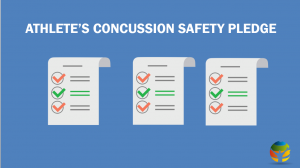Contact and collision sports at all levels are characterized by what some call a “culture of resistance” by athletes to honest self-reporting of concussion symptoms.
From an early age, and throughout your athletic career, you have likely been under pressure – sometimes subtle, often explicit – from your parents, teammates, and coaches to play hurt.
Chances are that, like many athletes, you have developed a belief that playing with concussion symptoms – at the risk to your own health – is not only acceptable, but expected; and you may have been criticized, penalized, and ostracized if you did not go along with these team and cultural norms.
Up to now concussion education has focused almost exclusively on teaching you about the signs and symptoms of concussion and the health risks of concussion and repetitive head trauma in the hopes that, being able to recognize when you may have sustained a concussion, and knowing the risks from continuing to play, you would not risk of further injury and report your symptoms right away.
Unfortunately, for a variety of reasons, such education hasn’t worked to change the concussion reporting behavior of athletes. Even though you probably now recognize that continuing to play while concussed puts your health at risk, a lot of you continue to hide concussion symptoms in order to keep playing, with between 40 and 60 percent of all concussions – and a much higher percentage of so-called “bell-ringer” events – still going unreported.
Fifty-fifty
So why so many you continue to hide your concussion symptoms?
Research over the last decade reveals that the top ten reasons athletes consistently give for not immediately reporting concussion symptoms are that:
- They did not think they suffered a concussion,
- They did not believe it was serious enough to report,
- They were not aware of the potential negative health consequences from continued participation;
- They believed that they could safely delay disclosure until their removal was less likely to affect game or practice play, or until the symptoms got so bad they could no longer be ignored;
- They did not want to be removed from the game or practice;
- They did not want to disappoint coaches, teammates, parents, and fans by coming out of the game;
- They felt pressure from coaches, teammates, parents, and fans to play injured;
- They believed that coaches, teammates, parents, and fans expected them to play injured;
- They feared suffering negative consequences if they reported concussion symptoms, such as loss of playing time or position as a starter position, or having their toughness questioned;
- They did not think their own positive attitude toward concussion symptom reporting was shared by the coach, medical staff, and teammates, so that they hid their symptoms for fear of social disapproval.
Notice that of the ten, fully half have nothing to do with your knowledge of concussion signs and symptoms or the health risks of concussions, but have everything to do with your attitudes and beliefs about concussion reporting, what you think might happen to you if you report, and what you think are – and in many cases, may actually be – negative attitudes of coaches, teammates, parents, and fans about concussion reporting. The bottom line is that many of you play sports in a climate in which reporting is discouraged, and in which you simply don’t feel comfortable reporting.
Attitude Adjustment Time
So SmartTeams™ is trying something different – or, in the parlance of American football, a new game plan – to try to get more of you to report concussion symptoms, one which recognizes that the reason you don’t report is not so much a result of a lack of knowledge about concussion symptoms and the health risks of continuing to play with such symptoms, as it stems from a belief that you are expected to play through injury (even a head injury), a belief that the coach, teammates, parents, and fans would be disappointed if you didn’t shake off the injury and stay in the game, and, even if you believe reporting symptoms so you could be checked out on the sports sideline is the safer course, a belief that you would be violating the team’s unwritten code of silence and would be viewed as a bad teammate if you reported.
Like the Centers for Disease Control and an increasing number of concussion experts, SmartTeams™ believes that the best way to increase the chances that you will routinely report concussion symptoms, either your own or your teammates, is for coaches, parents, medical staff to work with you as a team to change reporting behavior by changing individual and team reporting attitudes and norms and by creating a climate in which you feel comfortable reporting your symptoms.
So we have designed a program to show you how immediate reporting of concussion symptoms not only reduces your risk of further injury – or, in rare cases, even death – but is actually helps your team’s chances of winning, not just that game, but, by you the best chance to return as quickly as possible from concussion, in future games, by getting everyone to agree that honest reporting is a valued team behavior, and by all working together to create a climate in which you feel comfortable in reporting.
Five-Part Program
The SmartTeams™ #TeamUp4ConcussionSafety™ program consists of five steps:
1. Testing Knowledge and Attitudes
A growing body of scientific research leads SmartTeams™ to believe that you will be more likely to immediately and honestly report experiencing concussion symptoms, both your own and your teammates, if you, along with your coaches, teammates, and your parents, not only know about concussions, but about your current attitudes towards and beliefs about symptom reporting.
To do that, we are asking you and your teammates to take a series of quizzes (the results of which will NOT be shared with your coach, your parents, or your teammates, but which you, of course, can share if you want to via social media):
- Do You Know The Concussion Basics?
- Do You Know The Signs and Symptoms Of Concussion?
- Athletes: Does Concussion Safety, The Team, Or Winning Come First?
2. Completing a Concussion Safety Course
While you probably know a lot more about concussions than athletes did a decade ago, it is likely that some of you could benefit from learning more, so we are asking you in Step Two in the #TeamUp4ConcussionSafety™ program to continue learning about concussions by taking an online concussion education course and by watching The Smartest Team documentary (streaming free on this website)
3. Attending a Concussion Safety Meeting
Because studies show that one-off concussion education isn’t enough to change concussion symptom reporting behavior, Step Three in the SmartTeam™ #TeamUp4 ConcussionSafety™ game plan then calls for you to attend a mandatory concussion safety meeting before every sports season to learn in detail from your coaches, athletic trainers, and team doctors about the importance of immediate concussion symptom reporting, not just in minimizing the risks concussions pose to your short- and long-term health, but in increasing the chances for individual and team success, and where you, your coaches, and your parents can begin the process of creating an atmosphere in which you feel more comfortable in reporting your symptoms, and seeing such reporting as the responsibility of every member of your team.
4. Taking a Concussion Safety Pledge
There is some evidence to suggest that athletes who sign pledges acknowledging their responsibility to report concussion symptoms makes it more likely that they will actually report concussion symptoms and encourage their teammates to do the same.
Step Four of our new concussion safety game plan thus calls for you, along with your coaches and parents to sign a concussion safety pledge at or shortly after the pre-season concussion safety meeting in order to demonstrate in a tangible way your commitment to creating a culture in which you, your teammates, your coaches, and your parents see immediate reporting of concussion symptoms as a valued team behavior and the responsibility of every athlete on the team.
5. Staying Involved
Because negative attitudes towards concussion symptom reporting are deeply entrenched in our sports culture, SmartTeams™ strongly encourages you to continue working with your coaches, your teammates, the medical and athletic training staff, and your parents over the course of the sports season to create and maintain a climate in which you feel comfortable in immediately reporting concussion symptoms (both your own and your teammates).
One way to do that is by sharing and reinforcing positive messages about the importance of immediate concussion symptom reporting via social media, so we encourage you to share success stories and positive messages on Twitter @SmartTeams, via your favorite social media app, on the SmartTeams™ Facebook page, via YouTube, and by maintaining open lines of communication and engaging in an ongoing dialog about concussion safety with your coaches, teammates, parents, and your athletic trainers.
Four Goals
The four goals of the SmartTeams™ “Teaming Up For Concussion Safety” program are to teach you that:
- In honestly and immediately self-reporting concussion symptoms, and encouraging your teammates to do the same, you are not letting your coach, teammates, parents, and fans down, but are helping the team’s chances of success, not just in a particular game but in future games as well;
- Honestly and immediately self-reporting concussion symptoms, and encouraging your teammates to do the same are the responsibility of every member of your team and the hallmark of a good team player;
- Delaying the reporting of concussion symptoms – or hiding them completely – puts your health – and even those of your teammates – at risk by exposing your already injured brain to further damage, potentially even death; by prolonging the time it takes for your to recover by almost a week; and by doubling your chances of needing 8 or more days to be cleared to return to contact practice; and
- Not honestly and immediately reporting concussion symptoms can hurt your own athletic performance and the team’s overall performance.
With consistent messaging and constant reinforcement of the value of immediate concussion reporting in achieving your individual and team performance goals, we believe that, not only will your attitudes and beliefs about concussion reporting begin to change, but your concussion reporting behavior will start to change as well, and that, over time, the culture of resistance to concussion symptom reporting will be replaced by a sports culture of concussion safety.




